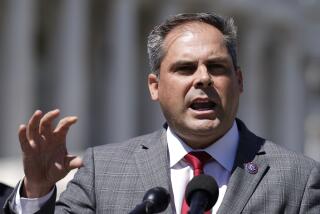Halt Bush’s Tilt to Left, Conservatives Tell GOP : Politics: Five leaders from the party’s right deliver a blast at the President for agreeing to a tax hike and for his stands on foreign, social issues.
WASHINGTON — Five conservative leaders Friday accused President Bush of breaking his word to the American people on foreign, social and economic issues, notably by agreeing to a tax hike. They called on the Republican Party “to take a stand” against Bush’s “steady turn to the political left.”
This blast from the right is the latest development in what is turning into a long, hot summer of political discontent for the Bush Administration. For the first time since the 1988 election, the GOP finds itself on the defensive against Democrats, who are mounting an aggressive challenge to Bush’s handling of the savings and loan scandal.
And the public complaint by the five conservative activists, issued in the form of a letter to Republican National Chairman Lee Atwater, followed on the heels of another attack on the tax hike decision--a scathing critique of Bush’s controversial move in the latest issue of National Review, the influential conservative periodical.
Appearing here at a joint press conference, the five conservatives--L. Brent Bozell III, director of the Conservative Victory Committee; John Cregan, president of the U.S. Business and Industrial Council; David A. Keene, chairman of the American Conservative Union; Howard Phillips, chairman of the Conservative Caucus, and Richard A. Viguerie, president of United Conservatives of America--spoke more in sorrow than anger.
They did not directly threaten Bush with a challenge to his expected bid for renomination in 1992, although Phillips warned that such an effort is likely if Bush does not shift his course. But their more fundamental concern, said Keene, is that the President “would weaken himself so much politically that he won’t be able to win no matter what we do.”
Bush’s actions, Keene contended, amount “not only to bad policies but also dumb politics.”
In addition to the tax hike issue, which was the focal point of their unhappiness, the conservatives’ bill of complaint criticized Bush for lifting economic sanctions against China; seeking to ease trade restrictions against the Soviet Union; supporting funding for the National Endowment of the Arts, despite its sponsorship of allegedly pornographic work, and for considering support for new federal regulations in such areas as child and health care, the environment and campaign reform.
Leslie Goodman, a spokesman for the Republican National Committee, refused to comment on the letter from the conservatives because she said party officials had not had time to read it.
As an example of action conservatives hope Republicans will take to counter the President, Cregan of the Business and Industrial Council cited a resolution now before the House Republican Conference, which consists of all 176 GOP House members. The resolution would put them on record as opposing any new taxes or tax rate increases. The conference is expected to vote on the resolution Wednesday.
Release of the letter to Atwater was timed to coincide with the meeting of the Republican National Committee in Chicago, where party leaders seemed mainly concerned with responding to the offensive on the savings and loan fiasco launched two weeks ago by Democratic National Chairman Ron Brown.
Brown linked the growing cost of the savings and loan bailout to Bush’s willingness to accept an increase in taxes. “We have found the one cause for which George Bush is willing to break his ‘no new taxes’ pledge,” Brown said, “the bankers and speculators who ran the savings and loan industry into the ground.”
“I think it’s the only orchestrated attack they’ve had in nearly two years,” said Mary Matalin, Republican National Committee chief of staff, of the Democratic attack. “But this is not an issue the voters will believe them on.”
Nevertheless, speakers at the national committee meeting in Chicago made sure that they provided plenty of reassurance for the party faithful on the controversial tax cut. In remarks Thursday, explaining Bush’s decision, presidential pollster Robert Teeter argued that “a good economy is good politics” and contended that reducing the budget deficit, as Bush intends, is the surest way to guard the economy’s health.
Similar words of comfort were spoken Friday by Vice President Dan Quayle, who told a luncheon session in Chicago that “the President is willing to go the extra mile in seeking to forge a budget agreement that would be good for America.” But Quayle added: “Let me assure you of this, this President will insist on a good deal--one that is good for our economy and good for our country. His position is simple--a good deal or no deal at all.”
A much bleaker view of the prospects for Bush’s economic policies is expressed in an article in the July 23 National Review written by Paul Craig Roberts, former assistant secretary of the Treasury in the Ronald Reagan Administration and a militant advocate of supply-side economics. Entitled “Bringing Down the House That Reagan Built,” Roberts’ article contends that Bush has “destroyed his credibility . . . split the Republican Party and made the Democrats’ day.”
Two accompanying articles warn that a tax increase “could do significant long-term damage to the Republican Party” and charge that Bush’s tax shift was based on “the shaky assumptions that a) the deficit really is out of control and b) the Democrats are serious about reducing it.”
More to Read
Get the L.A. Times Politics newsletter
Deeply reported insights into legislation, politics and policy from Sacramento, Washington and beyond. In your inbox three times per week.
You may occasionally receive promotional content from the Los Angeles Times.










